Should You Bug In or Bug Out? What to Know
If, over the years, you’ve become an established prepper who’s taken the preventive measures of gathering supplies while learning critical survival skills, you’re already way ahead of most Americans. Maybe you’ve taken it further by preparing a bug-out location destination that your family can escape to if a desperate scenario demands it. Let’s talk about whether you should bug in or bug out.
No one ever wants to imagine abandoning their home when an evacuation directive is given, but there may come a day when you have no choice. But there are also situations where bugging out may have disadvantages and not be the right choice. So, how do you know whether to stay put or head for the hills? Here’s more on whether you should bug in or bug out following an emergency and what you need to know based on various factors to help you make an informed decision.
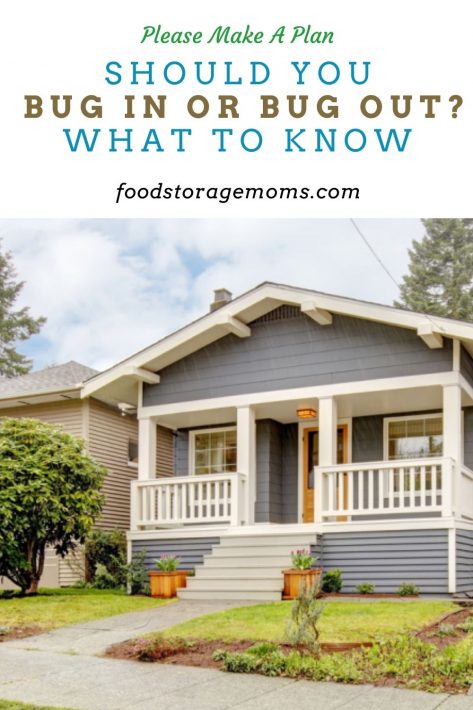
“Prepare Your Family For Survival” by Linda Loosli
Bugging In by Raymond Dean White
Flashlights and Headlamps
In case you missed this post, 15 Reasons Why You Do Not Want To Bug Out
Benefits of Bugging In
Security
For starters, bugging in allows you to continue living in the comfort and safety of your own home. You know your home better than anyone, and that familiarity is valuable: its strengths and weaknesses give you the home advantage. Riding out the threat inside the confines of your home gives you the best chances of survival since you know your surroundings and how best to ensure your well-being.
Resources
Another valuable and priceless asset that bugging-in brings is that you would have many more resources available. You’ll have exponentially more emergency preparedness supplies on hand, such as stockpiled food items and water, survival gear including tools, and even proper hygiene and sanitation. Not to mention a shelter like a tent that you wouldn’t have to take with you everywhere you went. Bugging in also allows you to continue growing and harvesting produce from your garden if you’ve planned and planted one.
Safety In Numbers
Choosing to bug in gives you safety in numbers, something that you wouldn’t have if your family were to go off on their own. There would be a community of friends, family, and neighbors with various skills and strengths that could benefit everyone. There’s sure to be someone reasonably close by with a medical background who can assist you if you get sick or poorly injured.
Benefits of Bugging Out
Removes You From Imminent Danger
A natural disaster may put you in emergency situations where you must evacuate your home. Unfortunate circumstances may prove so severe that you’ll have to bug out. Good examples are if your home was destroyed or badly damaged by a tornado, fire, or earthquake. On the bright side, there’s typically aid and help available to you for recovery following a natural disaster.
Or maybe your area is preparing for an oncoming hurricane, flooding, or an out-of-control wildfire? Deciding to bug out is the correct course of action in these situations. Don’t hesitate or blow them off if authorities are urging you and other residents to evacuate. Timing is critical. Waiting too long can put your family in harm’s way or leave you stranded in stand-still traffic on the highway or in a high-risk position if you stay put.
Better Location
Suppose you are living in a highly-populated city when an emergency strikes. In that case, there’s sure to be plenty of chaos, along with possible looting or riots as people begin fighting over minimal resources. Making the quick decision to get out promptly and head to your bug-out location that’s further out in the suburbs or countryside will undoubtedly be a safer bet for you.
Drawbacks to Bugging In
Unprepared Family and Friends
Most people aren’t prepared for any emergency. They didn’t stock up on food, water, and first aid supplies ahead of time. If your family and friends know that you hold a decent supply of critical resources, they will surely come knocking. Those supplies you intended for your family will dwindle to nothing sooner if you have to care for a larger community or even your own family for an extended period of time.
Poor Location
Hunkering down in your home after a disaster may seem the best option in most situations, but not if it’s in the wrong location. As mentioned earlier, living in the city is not the place to be following an emergency that causes civil unrest.
There may come a point where the supplies and resources that you’ve gathered may not be enough. Does your bug-in location have outdoor resources, such as a river for drinking water or a wooded area for firewood? Can you hunt any wildlife to provide food for your family or enough backyard to grow a garden? If not, bugging in may not be a good option.
Drawbacks to Bugging Out
Weather Conditions
Chances are, an emergency isn’t waiting around to present itself on a day that promises you beautiful sunshiny weather. You may need to take flight during a winter snowstorm, an unforgiving heatwave, or a flood prompting a rainstorm. Are you prepared to sleep out on the frozen ground at night with only a sleeping bag? You’ll have to consider these harsh weather conditions as you prepare before you set out.
Your Bug-Out Location Isn’t So Secret
Putting all your eggs in one basket can be dangerous when relying on a bug-out location to sustain you. Setting out on foot already puts your family in a vulnerable situation, but what happens if you arrive at your bug-out location and find that it’s already been occupied? Where will you go then? Pouring all of your resources and supplies into that one location may come back to haunt you.
Too Many Uncertainties
Having to live as a refugee in a different environment with very few resources is sure to cause an insurmountable amount of stress. You’ll be faced with so many unknowns, even if you have a bug-out bag for each family member or a survival kit for the whole family. Especially when you run low on supplies or realize your current bug-out location is no longer safe.
Worrying about the next place your family will rest for the night or where you’ll find your next meal and clean water can make you desperate. Once you’ve become desperate, you’re more susceptible to making deadly mistakes.
Requires Survival Skills
Bugging out will prove that much harder for those lacking basic survival skills, and most people don’t have them. Most of us have a first aid kit, but we may not know how to use all the supplies. Not only will you need these skills to survive, but you may also need to be at a higher fitness level to perform specific complex tasks.
Final Word
Bugging out should always be your last resort when facing an emergency, but there may come a time when your home no longer offers your family comfort and security and you’re forced to evacuate. A well-thought-out emergency plan takes time and needed resources. You also need to practice to make sure all family members know what’s expected and how to contribute. The mobility of each family member needs to be considered, especially if you have young members or those with unique needs.
Take the time to review all these topics with family members and consider their input. Self-reliance training and following action plans can save lives!
Determining whether to bug in or bug out depends on the emergency you are facing, your family circumstances, and any useful information you’ve been given ahead of time. Making wise decisions on a timely basis that prove best for you and your family will be critical. May God Bless this world, Linda.
Copyright Images: Grey Craftsman House Deposit photos_9583334_s-2019











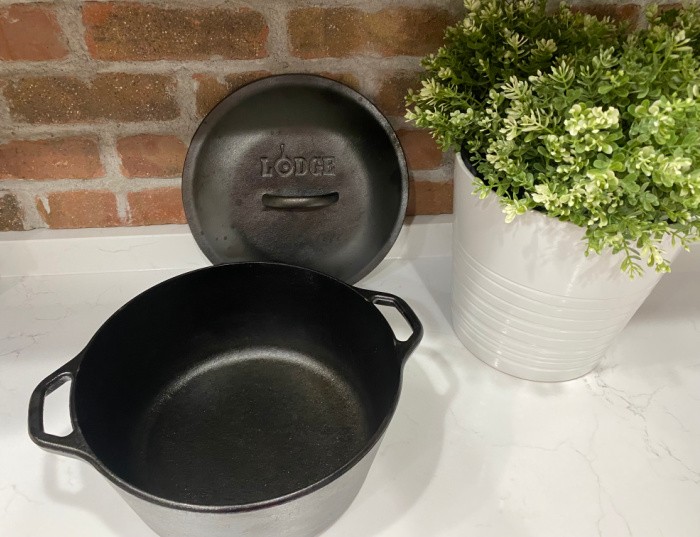



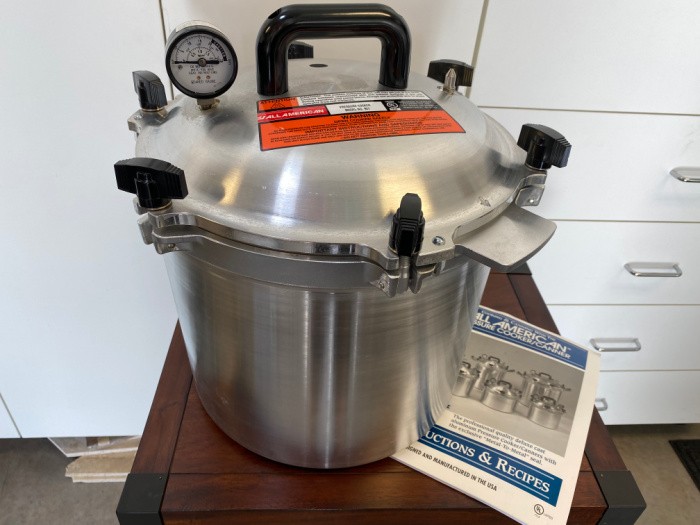
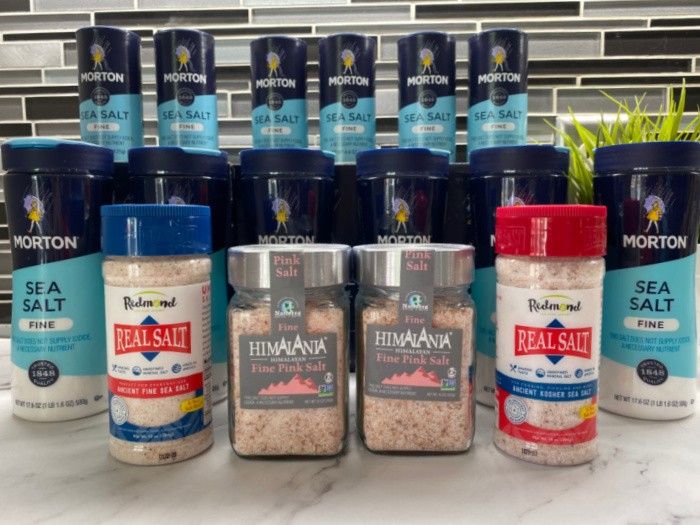


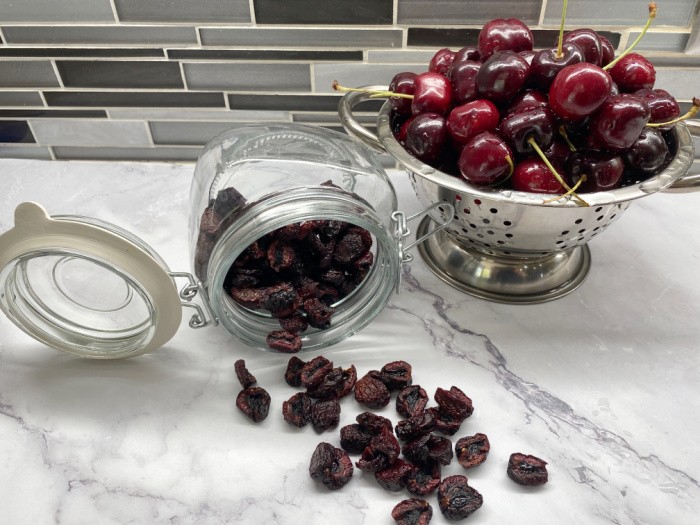


You must plan on the “unprepared” not just those who don’t but it is very possible someone in your group could lose everything in route or before.
Fire, tornado, flood or ambush.
I’ll not turn them away because of it. This is why we have somewhat standardized equipment, shoot together, train together and work together so we all know each other and what we’ve got. In fact mine is coming today to help me clean up from the ice storm. We will see chain saws and abilities today. We will have extra firewood too for the next bug in.
Great article and spot on Linda.
Hi Matt, thanks for your kind words. I always love hearing about your team, it inspires me and others. I’m so glad you have people coming to clear the trees. Ice storms are brutal. Stay safe, my friend, you are on the front line, we thank you for your service. Linda
I sincerely hope your readers pay attention to all the pros and cons you so ably stated. I am so glad I live rural because if I still lived inner city, I’d be worried, maybe checking on rural property my son’s dad owns as an alternative but there’d be No supplies at any of them. Possibly neighbors would think I’m a squatter/intruder. I would have had to outfit these places already and it’s hard enough to make sure I have enough extra in my own home. A wierd thought popped into my head: when I lived inner city, we found that my yard soil was contaminated by lead from when cars ran on leaded gas. I replaced 12 inches of topsoil in the front yard where my youngest played, then never allowed him to play in backyard. In spite of the Very Clear Disclosure about this on property sale, the young people promptly planted a huge garden there. If a city person thinks they will ever plant a garden, especially if they think they may have to, it’s not too late to have your soil tested. If it comes back contaminated, take the time Now to set up raised beds. Just a wierd thought…
Hi Wendy, WOW WOW WOW! I never knew this about the soil and cars with leaded gas!!! I know when I was a realtor we had to disclose the soil test for new homes. But never was I ever taught about the lead in the soil. Wow! I have raised garden beds because I don’t want to lean over. I will not bug out, I have everything I need here. But I do not live in a major city either. God bless our country during the next few weeks or months. Stay safe, Linda
Being in a rural housing area on two acres, it would be an extreme last resort for us to bug out. Unfortunately, because it is so rocky here in the Texas Hill Country, a garden is basically impossible. We have thought about raised beds, but have just not gotten around to it. We will probably soon have a truckload of good soil hauled in and stockpile it until we can prepare the raised beds. We only have a couple of neighbors who are very loosely considered prepared slightly. We also have friends about six miles away that have 30 acres of somewhat bottom land with a continuous spring. They have a small garden that we could expand if need. If push came to shove, we could load a lot of our preps and bug out there for a while. But, that is about as far as we would go. They also have a loosely formed group who we are acquainted with and who will accept us if it comes to that. Hopefully, we will be able to stay here where we have all our supplies, tools, food and defensive tools.
Hi Harry, I would love to have two acres, but we will be here for a few more years. Mark and I will not bug out, the closest city that I worry about is Las Vegas, Nevada. I grew up there and it’s so different now. I picture them having major riots, but they are 1-1/2 hours away. I tried to teach classes in my home 8-9 years ago but very few were interested in the neighborhood. They didn’t see the need that I do. So that’s when I started my blog to teach the world. So Mark and I will most likely be on our own. You are blessed to have options if it comes to that. Stay safe, my friend, Linda
I used concrete blocks for my raised beds. Great because I could move around any time I wanted to.
And, positioned just right, the holes in blocks were for marigolds.
Like Jayjay, I have also used concrete blocks for raised beds one year and then measured the harvest. I was very careful to do a layered soil using instructions on lasagna gardening. This was a small space 2 blocks wide and 7 blocks long. We planted 3 tomato plants and the harvest was 109 lbs. of delicious tomatoes. So Harry the Texas Patriot might also think about concrete blocks to start a raised bed garden. Linda, I also do raised beds because of having difficulty bending over. Growing to me is an essential skill when you will not be able to buy fresh produce. I live in a community where the backyards aren’t big but I try to make it productive. Salad greens, beets, green onions, tomatoes, peas and beans are grown. We (in our 70’s) will bug in. My husband has dementia and our medications are a big concern. We also have a mini Aussie dog.
This week, I had an unplanned event/emergency. When I went to an appointment at a new PC doctor, he informed me that my heartbeat was 175, not my usual 71. So here I was with my husband who can’t drive at the ER and was admitted for an overnight stay for additional testing. We began calling neighbors who came through with a ride home for my husband and back the next day. The ER administered the drug that got my heart rhythm straightened out and I came home with medication and added a cardiologist to my healthcare team. I had NO WARNING. It helped me see the importance of neighbors willing to help out can be. So thankful for life today!
Hi Carol, oh my gosh what a week for you! I like your idea of the blocks for a raised garden. I bought seven 4 foot by 4 foot by 18-inches deep boxes. They sure take a lot of soil, more than you would guess. I paid a college student to put them together and haul the bags of soil to my back yard which is only .16 of an acre as in tiny for my entire lot. What a blessing to have young men who want to work and earn money. Do you have high blood pressure or high cholesterol? What causes a heartbeat to be that high?? Oh my gosh. I will be praying for you, take care, Linda
Please take care of your health. My husband has had a heart condition for 40 years. I envy Matt and his extensive knowledge. I miss the neighbors we had for 30 years. We are lucky that our son is only 5 minutes away…… or as my grandson said, 3 minutes if Daddy is driving…..lol…. We are fortunate to be far enough from the city to feel reasonable safe, and my son has more than 15 acres with a creek. We have been here 4 years, and while our neighbors are nice enough, we don’t know them that well. Our daughter and her husband are 15 minutes away and would take us in if safety was an issue. I think our kids know enough about what is going on, and who is in charge, to let us know of any danger. I hate thinking and feeling this way.
Things have changed a lot since I wrote this previous post. My son sold his acreage and is now further away, as is our daughter. Our health has declined leaving staying put as our only alternative, unless our home is destroyed. All we can do, is our best to take care of each other. Please everyone, try to stay safe and health.
Hi Chris, I’m so glad you mentioned this about your previous comment. I always keep comments because they may help someone get prepared. I remember when you mentioned your son selling his land. I guess I forgot your daughter lived there as well and has moved. We moved close to our kids but I wish we had stayed put in Southern Utah, this build has been a strain on my health and well-being. It’s been almost 3 years in October we moved north. Hopefully, within the month we will be in our home. My health has declined (high altitude) I had no idea my lungs and heart were in such bad shape. Stress can ruin your health, I’m thinking. I keep blogging because I have made so many good friends through my blog like you and so many others. We will survive Chris, because we have good husbands and we are survivors. Hugs, Linda
Carol, my husband and I can totally relate to your issue! Last year, he went to his PCP for a cough-and was in rapid Afib, almost 200bpm. He landed in the hospital and was there for 5 days. They tried to convert him but it didn’t work so he was put on tons of meds for almost a month before an ablation procedure got him back in sinus rhythm. We also had No Warning! My husband was 66 at the time and in good health other than slightly elevated blood sugar. We are alone except for our adult handicapped daughter who lives with us (she’s 48, doesn’t drive, and is recovering from breast cancer) and another daughter who thankfully lives close by. Gkids and great gkids are all living their lives. We know our neighbors but not that well and couldn’t rely on them. Life is fragile, that’s fer sure…take care of yourself!
Linda, thanks for your comment and prayers. No high blood pressure. Cholesterol is very controlled with drug. The cardiologist will be trying to figure out what caused it. He told me that with the heart suddenly beating that fast that it causes the blood to pool in the heart and coagulate. Then a clot can separate and go directly to the brain for a stroke. With no warning symptoms, it is a dangerous type of AFIB. It is all so new and I will be learning along the way. So sometimes, like the COVID pandemic, it comes out of the blue, totally unexpected.
Hi Carol, I will continue to pray for your health, when we were young we didn’t have a care in the world. Wow, has that changed!! We must have positive thoughts and that’s very hard right now. I have to turn off the news and all the negative campaign ads. I have to watch a funny movie or call a happy friend just to hear a voice. Stay well, we will get through this. Linda
Wonderful article, Linda! My husband and I (68 and 65) will always try to bug in. We’re just too old with too many issues to bug out. Besides, we literally have nowhere to go. We will try everything we can to stay home but still, we do have out bug out bags, etc. We live rural on 1/3 acre but there isn’t good soil to grow and definitely not enough good weather. We get late freezes and early frosts every year, enough to ruin gardens. I’ve tried numerous times, different ideas, areas, plants, etc. and it’s just useless. The only thing I can grow are fruits from trees, peaches, apricots, cherries and apples. That’s all I can get so hopefully if SHTF I can barter. I’ve completely gone through my pantry and cleaned it up, threw away dated stuff and reorganized (thank you The Home Edit!) and have started on my basement. Still, I think as long as we can stay in our home, we’ll do pretty good…as long as that neighbor doesn’t sneak off with my firewood anymore! LOL I know we have several areas that need improvement and I’m working on them as I can. I read each and every one of your articles and while I know a fair amount of things, I always, always come away with more tidbits and knowledge to help me. I can’t understand why more people don’t prepare. You don’t have to be a fanatic about it; just basic, common sense. Aha! therein lies the conundrum-people don’t have common sense…it’s definitely a learned trait, IMO.
As always, Linda, keep up the good work!
Hi Robbie, I agree, I do not know why people do not prepare. I try to write things to remind people to think about preparing. In other words, make a way of life. Mark and I will not be bugging out unless an earthquake hits our home. Some people never learned commonsense. Thank you for your kind words, Linda
Linda, one of your best articles ever! You know where I stand on Bugging IN vs Out. I’d add that unless your mutual assistance group has bug out locales near you, you would be setting yourself up to being overrun by desperate scavengers. One or two people or even a small family simply wouldn’t be able to make a successful stand against a large group of marauders. But if you’re Bugging IN, your MAG is most likely already close by, giving you strength in numbers.
Harry–get those raised beds going buddy. As the saying goes, the best time to learn how to garden was thirty years ago, but better late than never.
Hi Ray, you know I’m bugging in unless we have an earthquake! I’m working on some safety tactics, I have to have them in place. We may be moving into our home by July 4th! Remember I laughed and said I will send fireworks through the internet in an image when we move in! LOL! Linda
Linda,
So glad to hear you may be able to move into your new home in the foreseeable future. I know it’s been a real grind. Looking forward to seeing your fireworks.
Hi Ray, I will keep you posted! LOL! Linda
Heh, Ray,
We know how to garden, just have not done it in a while. Thirty years ago our garden produced more green beans, squash, cucumbers, brussels sprouts, carrots, tomatoes and potatoes than we could keep up with. Unfortunately, that was in the Houston area with better soil and more rain than here in the Texas Hill Country. Limestone rocks do not make good garden soil. That’s why we will be using raised beds and working on getting some soil. We already have a giant mulch pile just waiting to blend into the soil. We dawdled a little too long to get in a spring garden but will be ready for a fall garden this year. Thanks for the encouragement though. Have a great weekend.
Harry, your Texas Hill Country soil sounds a lot like the caliche I have to deal with. Digging a garden plot with a rock bar and pickaxe was no fun. That’s why I went to raised beds. My advice is to use either cinder block or well braced metal panels and to make the beds at least two feet deep and three to four feet is even better. If you can do raised beds four feet deep you can use a bit of Hugelkultur (basically tree limbs laid in the bottom of the bed). As they decompose they will enrich the soil for years. Also if you make your beds that high you don’t have to bend over so far when planting or harvesting. I also advise lining the bottoms of your beds with hardware “cloth” as the metal mesh will keep out tunnelers like gophers, moles, rats and other rodents. (Learned that lesson the hard way). If you use cinder block be sure you extend your hardware cloth under the bottoms of them too.
In my case I have my raised beds surrounded with chicken wire fencing and covered with bird netting to keep out both rabbits and Gambel Quail (aka two-legged goats). Enjoy!
Hi Ray, I will be contacting you if I get my garden going, I will follow your instructions. Linda
Thanks for the tips on the raised beds. Sounds like good things to do. Yes, in South Texas we called it caliche which is just a low grade of limestone. There, it was more of a loose gravel size. Here in the Hill Country, there is the loose gravel size but with boulders of limestone intermingled. Definitely no sandy loam or black topsoil. That sort of soil begins about thirty miles east of us where the hills drop off into rolling plain.
For our raised beds, we were planning on using corrugated galvanized metal attached to cedar posts of which we have plenty. Actually ash juniper but works the same as cedar. We have a lot of chipped cedar which we were planning on putting in the bottom and then layering composted leaves before backfilling with topsoil. The chipped cedar would repel some of the bugs and such while the compost would add the nutrients. Can easily layer the bottom with tree limbs as you suggested before adding the other layers and on top of your suggested hardware cloth.
Glad to see you back. I have gained a information from and respect for both you and Matt.
Harry,
That respect goes both ways. Our caliche here includes large rocks and boulders of granite, but the caliche itself I found can be softened with the addition of water and gypsum. Wish that were so for the granite.
Hi Harry, we hope to do raised garden beds as well. We all need encouragement to get a garden going. I’ve miss gardening, not sure with my health I can do it. We shall see. I know I can grow lettuce indoors with my AeroGardens but there is nothing better than a red tomato from the garden to slice for a BLT! Love it! Linda
Great article Linda. I read(on another site) that one should go 200 miles from your home in case of %^&$ if you’re near a city but there is NOWHERE to go for us that doesn’t land us in a city and walking out is no longer feasible for the two of us, SO unless the house has blown up or burned down we will hunker down here, our kids know to head here with the grands and bring as much food and goods as possible. Along with the grand dogs, a195-200lb German shepherd/malamute mix and a very fearless shipoo mix, who will take on anything and anybody to protect her people, the grand chinchilla and grand lizard,YES they will come too.Wait til my two (spoiled) cats meet the dogs, we’ll never see them HA HA. My prayers are with Carol and all with health issues. I sure wish I was closer to Matt.I’d probably drive him nutzo,LOL with all my questions. I have and am learning a lot from you all. Thank you so much.
Hi Kathy, we’re in the same boat, We’re not leaving, health wise I can’t. Plus everything I need is right here. I love love love hearing you and your family have a plan. I went to wedding last night and was talking to a niece and she and her husband bought a house years ago with an acre of land. The reason being they felt strongly their kids and grands will be moving in with them based on how whats going on in the world. Good job, Linda
I hear ya Linda, We also can’t move due to health issues and I just pray I’m doing the right things for my family.
Hi Kathy, please remember we are doing everything we can to be prepared for the unexpected. There are people out there who have done nothing. They see no need to stock up, that’s okay. We are doing the right things for our families, we will survive! Linda